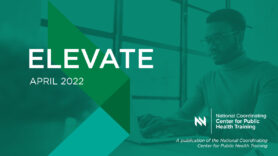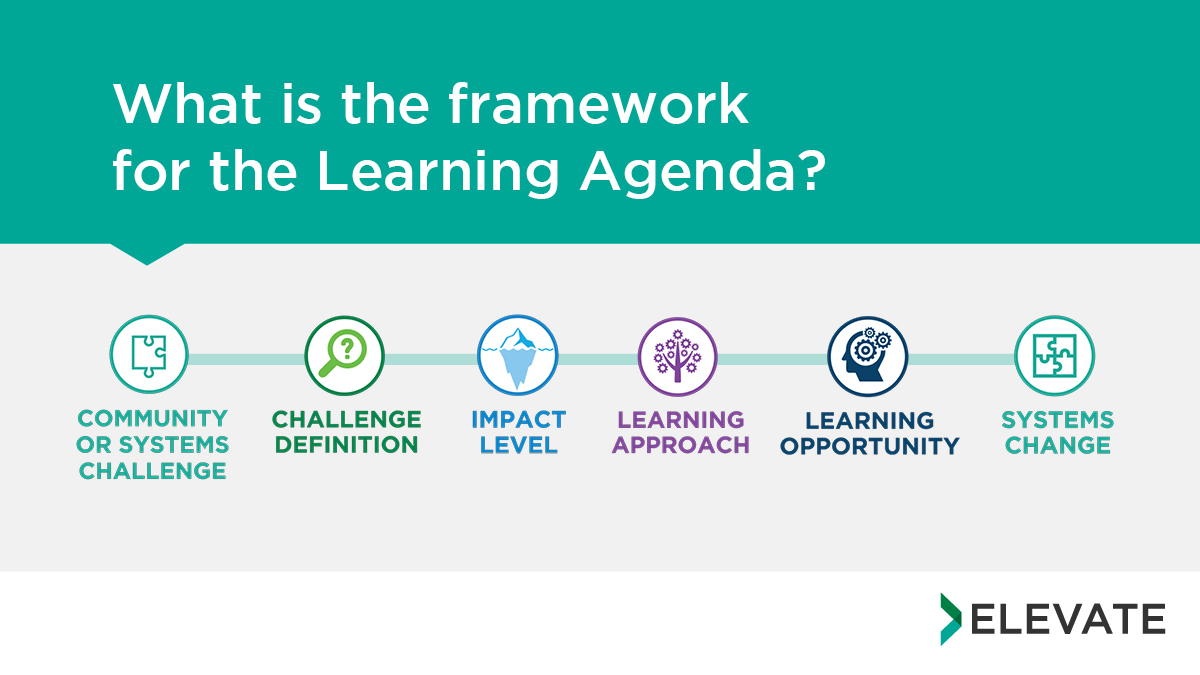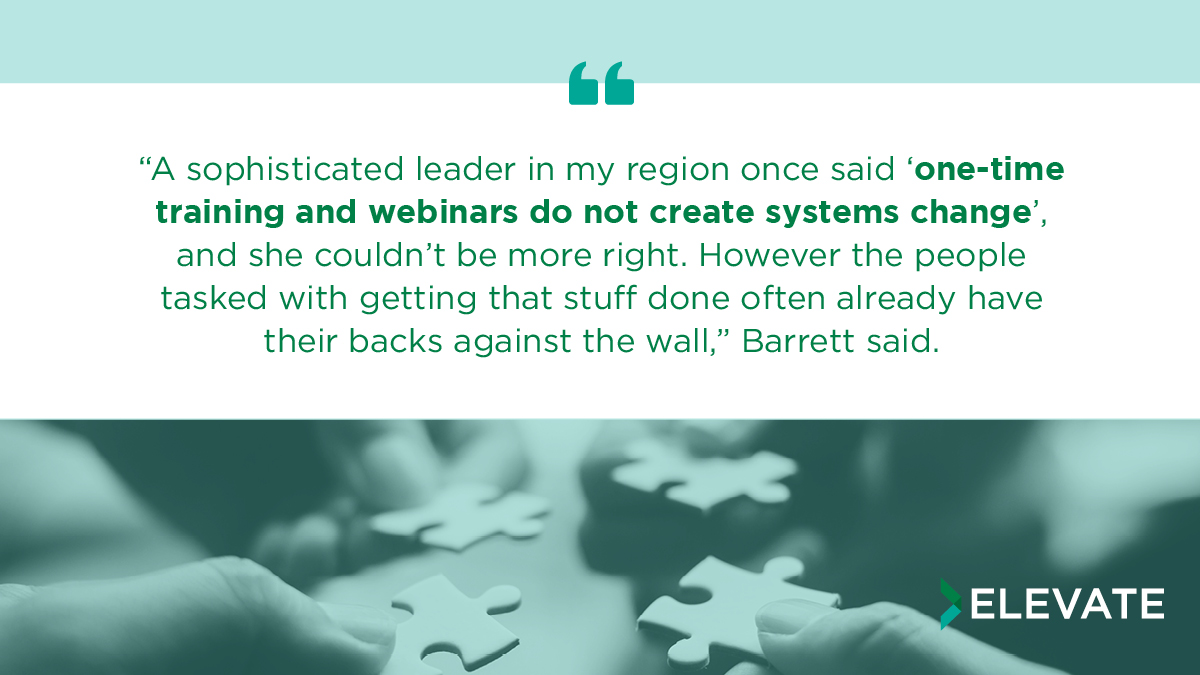Creating a Pathway for Long-Term Learning and Systems Change With the Public Health Learning Agenda
Systems change doesn’t happen overnight, and it can’t be accomplished in an evening. It’s the kind of alteration that requires being uncomfortable, questioning the status quo, and asking what public health can do to address inequities and disparities for everyone. That’s why the Public Health Learning Agenda is continuing the long-term work of asking difficult questions and challenging the approach to training.
The Public Health Learning Agenda seeks to facilitate deeper, more robust stages of learning that can increasingly impact systems change. To help practitioners develop a Learning Agenda, the Public Health Training Centers partnered with the University of Illinois at Chicago Policy, Practice and Prevention Research Center formed a Learning Agenda Team and launched a new an innovative resource in December, 2020 entitled Creating a Learning Agenda for systems Change: A Toolkit for Building An Adaptive Public Health Workforce (also known as the Learning Agenda Toolkit). This toolkit helps public health organizations and their partners envision how the public health workforce can address and achieve long-term systemic change. The foundation of this tool is a conceptual learning framework illustrating the concepts behind the Learning Agenda. Additionally, the Agenda incorporates the planning tools necessary for public health leaders and workforce development specialists, and their partners can use learning to achieve their vision of systems change.
Twenty-four public health teams across the country participated in the pilot of the Learning Agenda during the summer of 2021. These groups met, identified a community or systems challenge, defined that challenge by probing into the contributing factors, and then began work towards changing one of those complex sub-factors causes through learning design.
The teams spent time together asking questions grounded in systems thinking to uncover the root causes of a community health challenge in their scope of influence.
“That level of analysis takes bravery and can feel for a bit like a walk in the wilderness,” said Karla Barrett, project co-author and Senior Program Manager and Training Specialist for the New England Public Health Training Center at the Boston University School of Public Health. “To do this challenging work, you have to go through the frustrations and push yourself outside of your comfort zone.”
These 24 groups were essential to helping the PHTC and PRC Learning Agenda Team move from the pilot version to the Learning Agenda 2.0. Data collected from the pilot testers came from three sources: application and worksheet data, key informant interviews by an evaluator, and pilot tester discussion. Evaluation results suggest that the majority of pilot testers found the Learning Agenda useful and valuable, providing an intentional process that fostered discussions on important topics and allowed teams to stay focused using a step-by-step process toward a clear vision that produced a concrete product for learning. In addition, pilot testers noted the Toolkit provided exposure to and a unique focus on systems thinking; however, participants reported having prior knowledge of systems thinking and experience in workforce development and public health would improve the Toolkit’s application and use.
Barrett said it’s not easy work to do, but it was interesting to see the pilot groups interact with the Learning Agenda. “The big ‘ah-ha’ moment that most of the users go through is that they realize instead of just doing competency-based training that they can get to systems change by looking at the challenge as a whole,” Barrett said. “That is a very different way of approaching workforce development.”
The Learning Agenda helps create a framework for systems change, and by doing so, it acknowledges the need for guidance towards systems change in the public health workforce. Barrett reframed this shift as an opportunity to slow down and look at things in a multi-year way and make better plans.
“A sophisticated leader in my region once said ‘one-time training and webinars do not create systems change’, and she couldn’t be more right. However the people tasked with getting that stuff done often already have their backs against the wall,” Barrett said.
Public Health Learning Agenda co-author Christina Welter, Dr.PH, Clinical Assistant Professor and Director of DrPH Program at the University of Illinois at Chicago School of Public Health emphasized how public health professionals are used to the idea of a “one-and-done” training and it takes some adjusting to approach a new way of learning.
Welter’s research and experience have shown most public health training programs focus on content in silos, one topic or competency at a time. This approach is inconsistent with the complexity of most public health challenges.
“There’s no one skill, topic, or content area that could possibly address racism for example,” Welter noted. “So we want to take a systems change approach to understand how we all look at the problem or opportunity and define it in a deeper, more holistic way. The first step is to acknowledge our current assumptions about our definition of the problem. Often, we see the problem differently”
Welter stressed that it takes time to work through and find the root of these systemic issues, but this intentional process enables public health professionals and organizations to employ a more comprehensive approach to learning. A one-time training on a particular topic is unlikely to address the root cause of systemic issues. Instead, different types of learning may be needed at different points. This might include coaching, mentorship, or action learning institutes. Addressing the root cause of complex issues also requires us to learn together with our partners over time.
Laura Lloyd, with Emory University, Rollins School of Public Health – Region IV Public Health Training Center, is a co-author for the Learning Agenda. She said one of the more important elements was forcing these public health teams to focus on what the challenge is and define it before they moved to the next step of what impact they wanted to make.
One of the most challenging aspects of using the Learning Agenda for teams is “thinking about how to approach learning at a different stage” to ensure public health organizations are able to “make more impact within the community and work toward changes within the system” according to Lloyd.
The Learning Agenda aims to lift the veil across different places and health organizations to get a better look at where systems change is needed. The project challenges organizations to ask themselves hard questions and confront the challenges that are at the root of inequality in health care.
“If we can help health departments look to the community for the answers, and help learn together to begin to really address systemic racism and other social determinants of health, that is really what this is about,” Welter said.
Next steps
With the data in hand, the team is preparing a manuscript about the pilot for publication, assembling a national practice and academic steering committee, and creating a structured process to guide the recommendations for the development of the Public Health Learning Agenda for Systems Change Toolkit 2.0. There have been approximately 1,000 toolkit downloads since December 2020. A new version of the Learning Agenda toolkit will be released in 2023.



 Subscribe To Our Communications
Subscribe To Our Communications